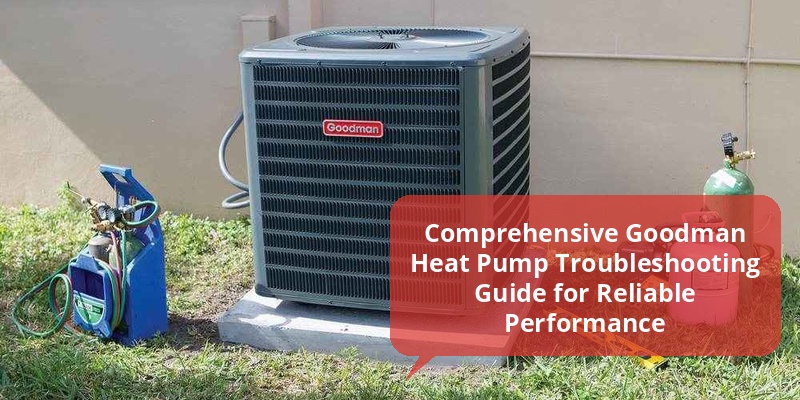Goodman heat pumps are a popular choice for efficient heating and cooling in American homes. When these systems encounter issues, prompt and accurate troubleshooting is essential to restore comfort and efficiency. This guide provides detailed insights into common problems, diagnostic methods, and practical solutions to help users maintain optimal performance of their Goodman heat pumps.
| Common Issue | Possible Cause | Suggested Action |
|---|---|---|
| Heat Pump Not Heating or Cooling | Thermostat settings, Refrigerant levels, Electrical issues | Check thermostat, Inspect electrical connections, Call for refrigerant recharge |
| Ice Buildup on Outdoor Unit | Dirty air filters, Low refrigerant, Faulty defrost cycle | Replace filters, Verify refrigerant charge, Inspect defrost control board |
| Unusual Noises | Loose parts, Debris in unit, Compressor issues | Tighten components, Clear debris, Consult technician for compressor |
| Short Cycling | Oversized unit, Thermostat malfunction, Refrigerant problems | Inspect thermostat, Assess unit size, Repair leaks and recharge |
Identifying Common Goodman Heat Pump Problems
Various issues can affect Goodman heat pumps, ranging from minor inconveniences to major system failures. Homeowners often notice problems such as a lack of heating or cooling, strange noises, or frequent on/off cycling. Understanding these symptoms helps to quickly pinpoint the source and take corrective measures.
Common issues include: thermostat misconfigurations, refrigerant leaks, electrical faults, sensor malfunctions, and mechanical wear and tear. Systematic troubleshooting ensures these problems are resolved efficiently.
Checking Thermostat and Electrical Components
The thermostat controls the operation of the heat pump. Incorrect settings or faulty wiring can prevent the system from functioning properly. Ensure the thermostat is set to the appropriate mode (heat or cool) and programmed for the current season.
Electrical components such as fuses, circuit breakers, and contactors should be inspected for damage or disconnection. A multimeter can be used to verify power supply continuity. Any issues with electrical input can impede compressor and fan motor operation.
Inspecting Air Filters and Outdoor Unit Conditions
Dirty air filters reduce airflow, causing strain on the heat pump and potentially leading to freezing or overheating. Regular inspection and replacement of filters are crucial for maintaining performance.
The outdoor unit must be free from debris like leaves or dirt that can block airflow. Additionally, inspect the coil for dirt accumulation. Clean coils enhance heat transfer, improving efficiency.
Seasonal maintenance including cleaning the outdoor unit and replacing filters can prevent many common problems.
Recognizing and Addressing Refrigerant Issues
Refrigerant is vital for heat transfer in the system. Low refrigerant levels due to leaks can cause inadequate heating or cooling and ice buildup on the coils. Signs of refrigerant problems include frost on the lines, hissing sounds, or a noticeable drop in system performance.
Only certified HVAC professionals should handle refrigerant recharging and leak repairs to comply with environmental regulations and safety standards.
Troubleshooting Defrost Cycle and Ice Buildup Problems
Ice accumulation on the outdoor unit during heating mode can inhibit performance. The defrost cycle melts this ice periodically. If ice persists, the defrost control board, sensors, or thermostat might be malfunctioning.
Check for dirty air filters and proper airflow before inspecting electronic components. Repair or replacement of the defrost control device may be necessary for continuous, ice-free operation.
Diagnosing Unusual Noises in Goodman Heat Pumps
Strange sounds such as rattling, buzzing, or grinding often indicate mechanical issues. Loose screws, fan blade obstructions, or worn bearings are frequent causes. The compressor can also produce abnormal noises if damaged.
Routine inspection and tightening of parts, as well as clearing debris, can eliminate most noise issues. Persistent loud noises require professional evaluation to prevent further damage.
Understanding Short Cycling and Its Causes
Short cycling occurs when the heat pump turns on and off rapidly, reducing efficiency and increasing wear. It may be caused by an oversized unit, thermostat location, or refrigerant charge problems.
Adjust thermostat settings, relocate the thermostat away from heat sources, and verify refrigerant levels. An HVAC technician can perform a proper sizing assessment and system calibration.
Performing Basic Maintenance to Prevent Major Issues
Regular maintenance is the best way to ensure a reliable Goodman heat pump. This includes:
- Changing or cleaning air filters monthly during peak seasons
- Keeping the outdoor unit clear of debris
- Checking thermostat batteries and settings
- Scheduling annual professional inspections and tune-ups
Proactive care reduces the risk of breakdowns and extends the lifespan of the heat pump.
When to Call a Professional HVAC Technician
While many troubleshooting steps can be performed by homeowners, certain issues require expert attention. These include refrigerant leaks, complex electrical repairs, compressor failures, and advanced diagnostics.
Professional service ensures safety and compliance with manufacturer warranties. Hiring certified Goodman technicians guarantees proper repairs that restore system efficiency and longevity.
